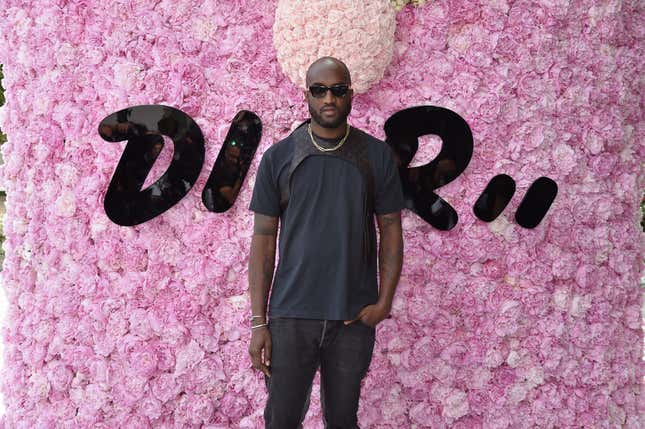
In late February 2021, Virgil Abloh’s Off-White released a varsity jacket with a logo that looked similar to the iconic “WW XXL Athletic” design of pioneering streetwear brand Walker Wear—so much so that founder April Walker wrote an essay in March 2021 expressing her concern, contempt and complete shock at the new design.
In her essay, Walker states she first saw the jacket in an Instagram ad that felt “too close for comfort in the design,” and wondered if Abloh specifically chose to riff on her designs because she was a woman. “The problem that exists here is a lack of integrity, lack of respect for culture and a lack of appreciation for women,” she wrote, adding: “The irony is that without me and others that have created this streetwear lane, Virgil wouldn’t be here today.”
Fast-forward to June 2021, when Walker “reportedly sent a cease-and-desist letter to Off-White and Saks Fifth Avenue (h/t Complex). Essence states that Off-White and Saks reportedly refused to “cease their infringing activities with Walker Wear Trademark.” When it was clear no corrective action was going to come from either brand, Walker Wear took it a step further and on August 20, filed a complaint against Off-White LLC for alleged trademark infringement and dilution, unfair competition and unjust enrichment. According to The Fashion Law, Walker also upholds that Off-White violated N.Y. Gen. Bus. Law § 349, which “prohibits deceptive and misleading business practices, and is seeking monetary damages and injunctive relief.”
This wouldn’t be the first time Abloh’s brand was in the news for a series of allegedly plagiarized designs. As reported by The Root in January 2019, Abloh was accused of copying designs from independent brand COLRS. Two months later, comparisons of his designs were brought to light by Instagram fashion sleuths Diet Prada, bringing a series of questions about Abloh’s artistic integrity to the forefront. Per a 2019 profile in The New Yorker, Abloh abides by his own cheat code, or the “‘three-per-cent approach’—the idea that one might create a new design by changing an original by three per cent,” and has openly acknowledged how he gets the inspiration for his designs from the work of others.
So what, exactly has Virgil potentially plagiarized this time?
The answer to that is somewhat unclear as there are multiple claims filed against him. First and foremost, Walker Wear LLC has claimed Abloh directly plagiarized the brand’s overlapped and stylized trademark “WW” logo on the front of a jacket that sports a “W” on each side of its front panels, which when closed, look similar to the “WW” from Walker Wear. However, Walker Wear’s “WW” trademark wasn’t filed until March 21, 2021 and wasn’t approved until July 1, 2021, according to the United States Patent and Trademark Office.
Nevertheless, there’s absolutely no way Virgil Abloh doesn’t know who April Walker is. As one of the first and still few women—let alone Black women—in the streetwear game, her designs have dominated the scene for over thirty years. To emphasize that point, in her lawsuit, Walker cites the confusion of people on social media after they saw Off-White’s jacket. However, The Fashion Law states that in most cases, “even where internet evidence can help it likely will not be strong evidence of a likelihood of confusion.”
An Instagram post penned by Walker on Tuesday addressed the suit and controversy, reading in part:
Setting the record straight. To my tribe….
I’m taking legal action against Virgil Abloh’s company Off-White, Saks Fifth Avenue, Farfetch, and all other relevant parties and for the record, taking a stand not just for myself, but for all women and black and brown creators across the world.
If you don’t know me, my name is April Walker, of Walker Wear and I’m the first female trailblazer of a multi-billion dollar category dubbed “streetwear.” Collectively, our community created its own thriving cultural and economic ecosystem. Yet decades later, our enduring cultural currency is not reflected in equity, ownership, or legacy stories. Despite the foundations we laid, many female brown and black designers still face the same “invisible” challenges, including that the big fashion houses like Off-White take our designs without permission and companies like Saks enable the conduct by selling articles with the stolen designs. They assume that we’d be outgunned if we challenged them in legal proceedings.
This year, it was brought to my attention that Saks is selling one of my classic designs as hijacked by an Off-White “mirror reflection” design, to the point where my customers were confused. My tribe hit me up with “congratulations on the collab” or on Saks selling my designs. When we asked Off-White and Saks to stop, they dismissed our concerns and made clear that they would neither address the harm they have already caused nor stop taking our designs. This attitude with designers like Off-White and sellers like Saks and Farfetch of “taking, making and regurgitating” our magic and selling it back to us with a price tag has to change. This incident reminds me of the nasty issues of the fashion industry. Double oppression. Gender and Race.
Amends must be made. From Dapper Dan to Pyer Moss to Tyler Perez and many more, we’ve encountered countless violations, but the future must be brighter than its pillaging past. Off- White and Saks I# have made clear that they won’t stop so I filed a complaint in Federal Court and I’m not going to be outgunned.
It’s undetermined what will happen next as the myriad claims will need to be looked at carefully, particularly how the case progresses in terms of the violation of N.Y. Gen. Bus. Law § 349.

